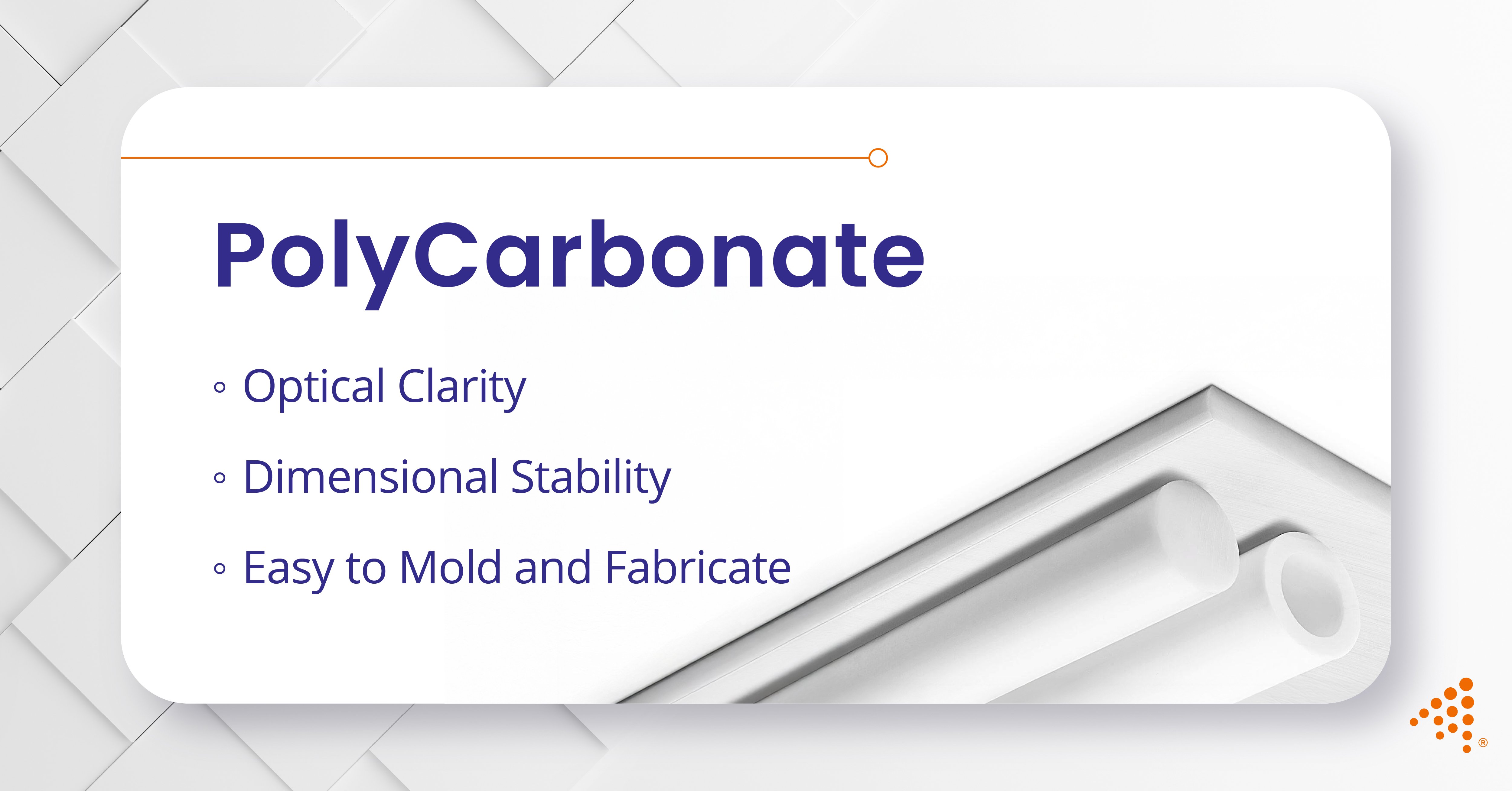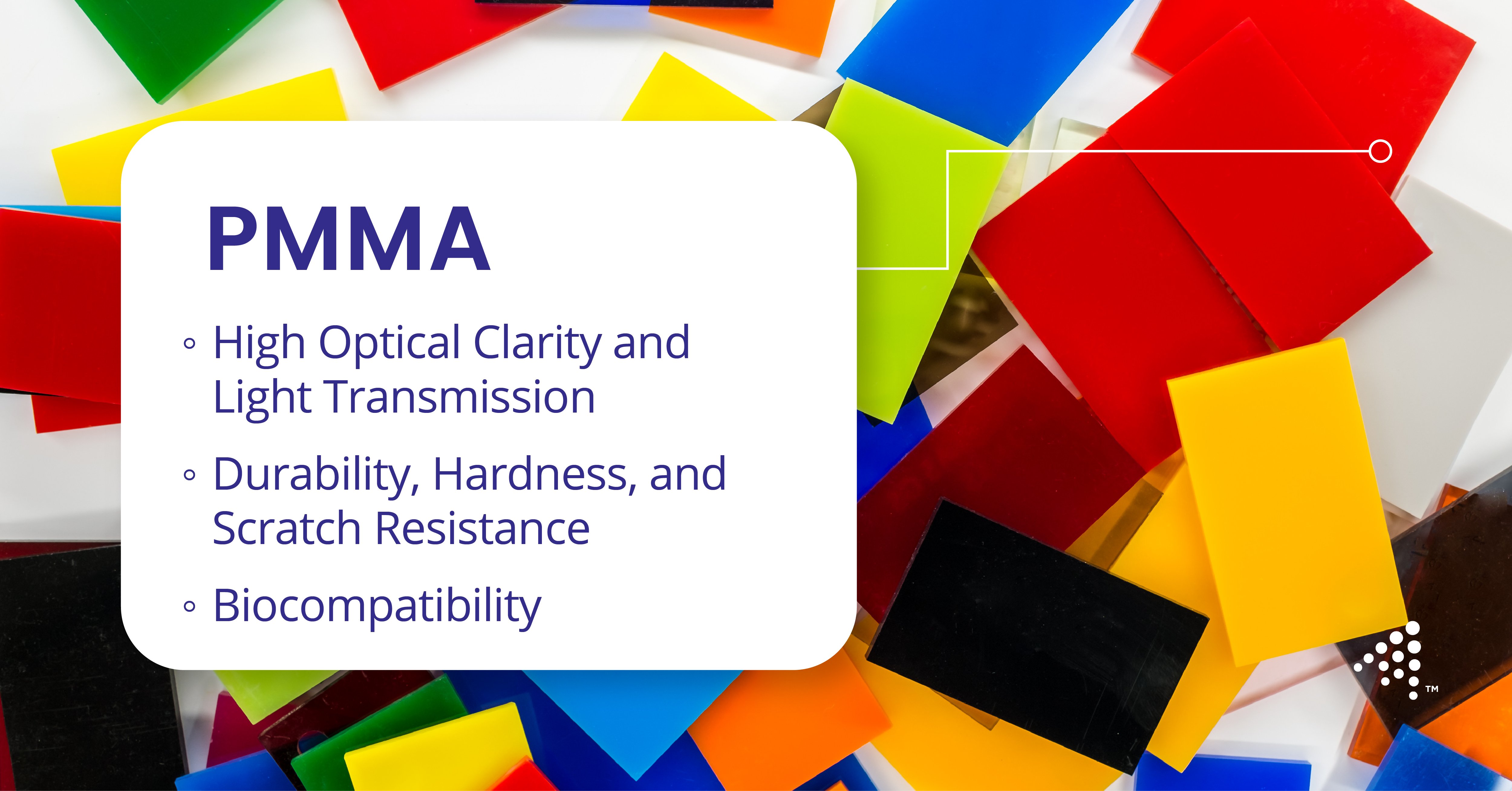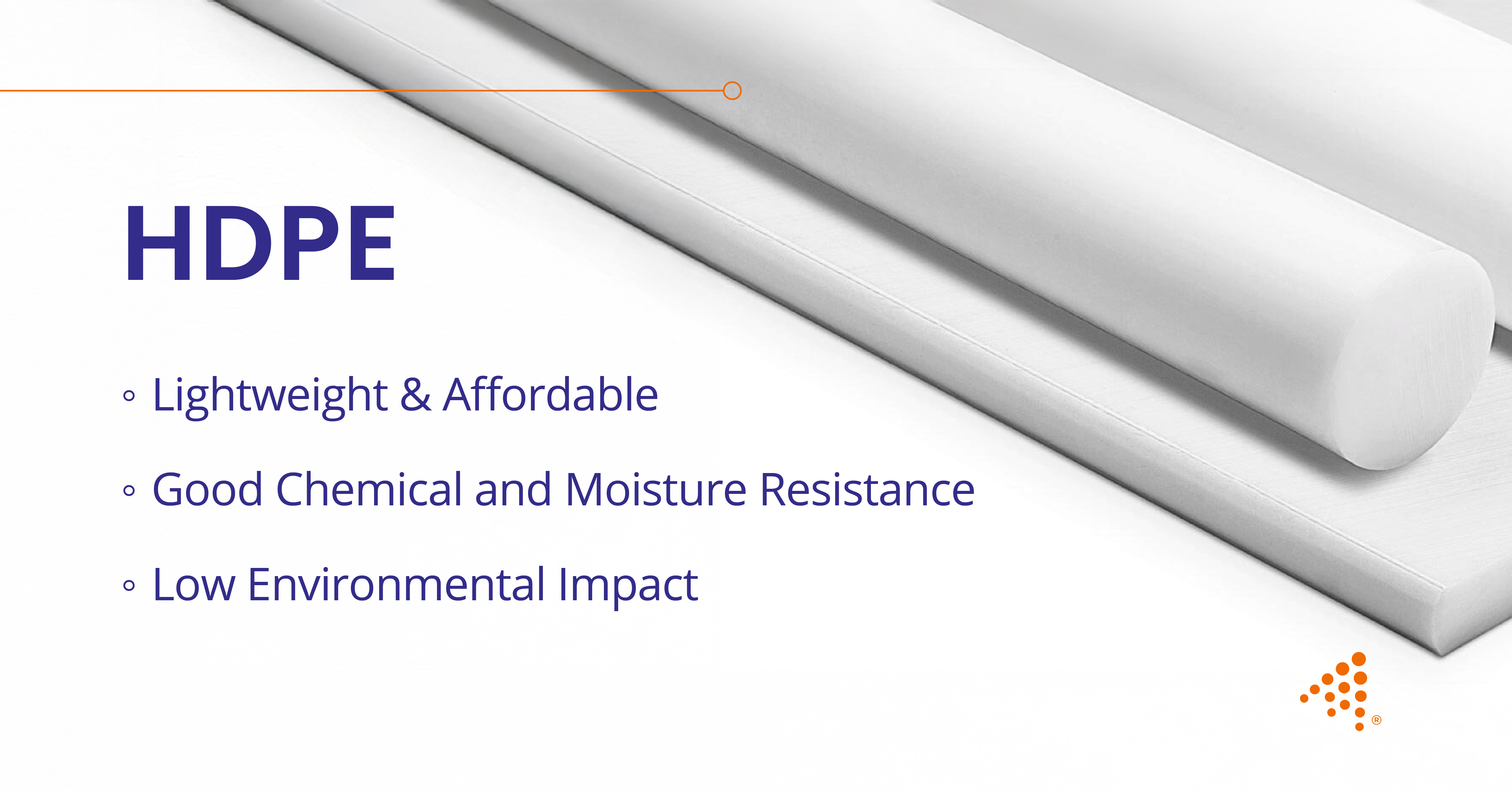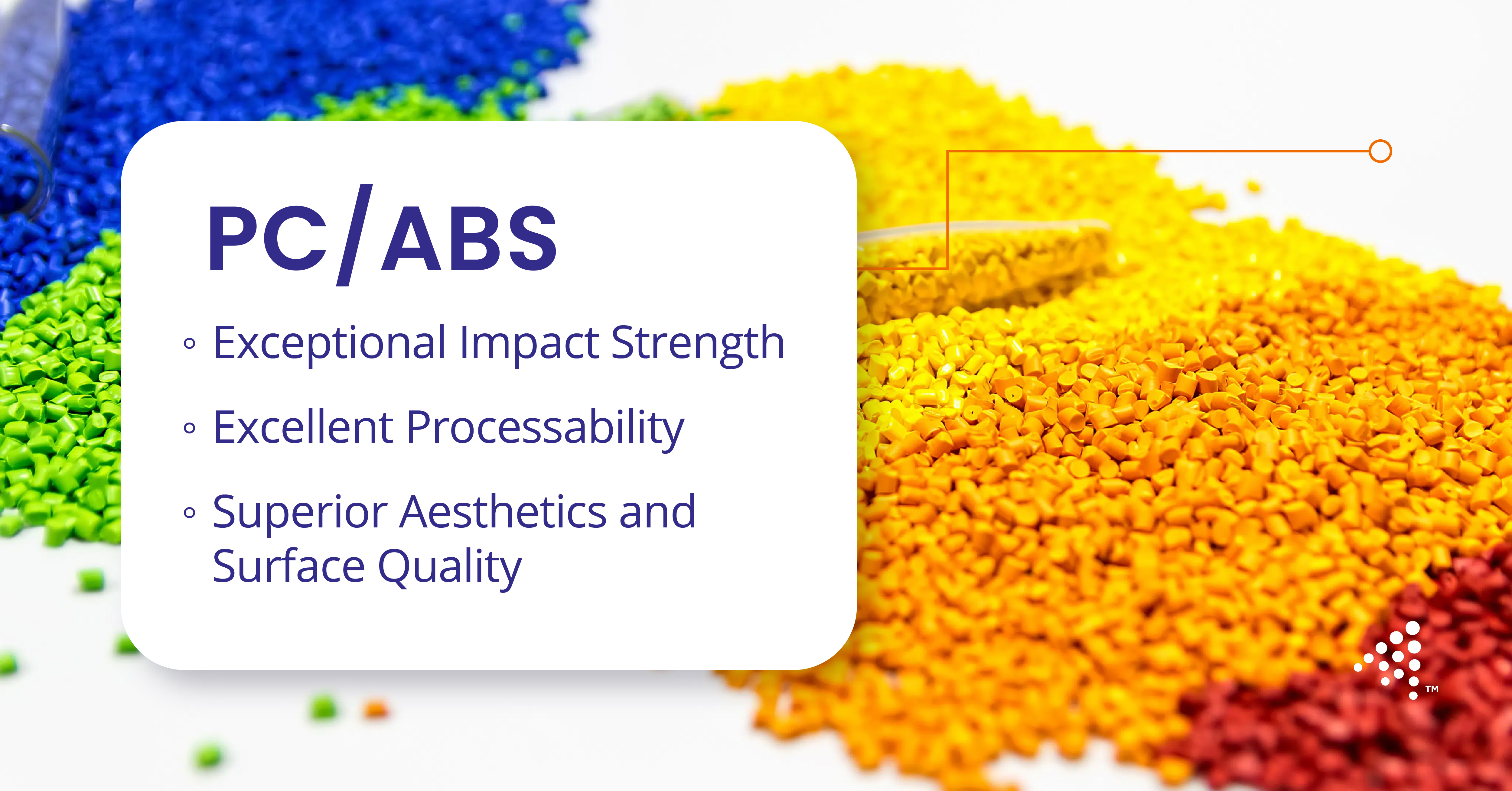PMMA (Acrylic): Resin for Clear and Durable Applications
Polymethyl Methacrylate (PMMA), commonly known as acrylic or by trade names like Plexiglas® and Lucite®, is a transparent thermoplastic valued for...
4 min read
Nick Erickson : Jun 16, 2025 9:01:00 AM

Polycarbonate (PC) is a versatile and high-performance thermoplastic resin known for its outstanding impact resistance, optical clarity, and heat tolerance. It is widely used in industries requiring both durability and clarity, including safety-critical applications such as eyewear, medical devices, and automotive components.
Polycarbonate is extremely tough and durable, making it an ideal choice for safety-critical applications that require superior impact resistance. Whether used in protective covers, automotive parts, or safety equipment, PC provides a strong and reliable material for demanding environments.
Polycarbonate is naturally transparent, with light transmission rates comparable to glass (up to 90%). This makes it a preferred choice for products like medical device housings, lighting covers, and safety goggles where clear visibility is essential. Additionally, PC can be easily tinted or coated to meet specific visual or UV-blocking requirements.
Polycarbonate maintains its strength and rigidity over a wide temperature range. Most grades can withstand continuous-use temperatures up to 125°C (257°F), making it well-suited for products that must perform under heat stress.
PC maintains its strength and impact resistance even at low temperatures, making it ideal for outdoor and safety-critical applications. It performs well in cold environments, retaining its toughness and durability when many other materials would become brittle.
PC offers outstanding dimensional stability, maintaining its shape and mechanical properties under load, heat, or during sterilization. This makes it valuable for precision-molded components—especially in the medical industry, where tight tolerances are crucial.
Despite its strength, polycarbonate is relatively easy to process via edical injection molding and thermoforming. It flows well in molds and supports complex geometries, thin walls, and tight tolerances. This versatility is critical for manufacturers producing intricate parts for medical or industrial use.
Contact Aprios today to discover how polycarbonate can meet your design and manufacturing goals.
Polycarbonate’s unique combination of impact resistance, clarity, and thermal performance makes it a go-to material for a broad range of high-performance products. Its versatility and ease of processing—especially through injection molding—have made it a popular choice across sectors such as medical, electronics, automotive, and consumer goods. Below are some of the most common and valuable uses of polycarbonate:
Polycarbonate is widely used in medical injection molding due to its strength, transparency, and sterilization compatibility. It’s often found in products like IV components, diagnostic device housings, surgical instruments, and blood oxygenators. PC’s ability to withstand repeated autoclave cycles, gamma radiation, and chemical sterilization processes makes it a reliable choice for both single-use and reusable medical devices. It also supports tight-tolerance, precision-molded parts essential in medical manufacturing.
Thanks to its clarity and impact resistance, polycarbonate is ideal for producing safety glasses, face shields, and transparent housings. It’s also used in optical lenses, lighting diffusers, and protective windows in industrial or laboratory settings—offering visibility without compromising durability.
Polycarbonate is used in rigid packaging, labware like centrifuge tubes and beakers, and transparent containers that must endure repeated use and sterilization. These items benefit from PC’s chemical resistance and durability, especially in environments requiring cleanliness and safety.
With excellent dielectric properties and flame resistance, PC is frequently molded into switch housings, connectors, circuit breakers, and enclosures for electronics. Its dimensional stability and resistance to thermal deformation make it well-suited for components that need to maintain shape and safety under electrical load.
From protective phone cases and water bottles to power tool housings and appliance components, polycarbonate is a common choice in everyday products. Its balance of toughness and visual appeal allows designers to create durable goods that look sleek and professional.
To enhance polycarbonate’s properties for specific applications, various additives can be introduced. UV stabilizers are commonly added to improve its resistance to ultraviolet light, preventing degradation and yellowing from prolonged exposure to sunlight. Scratch-resistant coatings are also frequently applied to PC used in optical and high-wear use cases to reduce the risk of surface damage.
Use our Material Selection Tool to compare properties and find the ideal resin for your next high-performance project.
While polycarbonate offers impressive performance characteristics such as impact resistance and clarity, it’s not without its limitations. As with any material, it’s important to consider potential challenges when deciding if PC is the right fit for a particular design or manufacturing need—especially when producing critical parts for sectors like healthcare or electronics.
Despite its toughness, polycarbonate is relatively soft on the surface and can scratch more easily than other plastics like acrylic. This is particularly important in optical or transparent components, where clarity is critical. In many cases, a hard coating is applied to PC parts to help resist surface abrasion.
Polycarbonate can be attacked by certain chemicals, such as acetone, which can weaken its structure. This limits its use in environments where exposure to harsh chemicals is frequent, such as in chemical processing or industrial applications.
Polycarbonate is more expensive than materials like polypropylene or polyethylene, which can make it less economical for low-cost, high-volume parts. However, in performance-critical roles—such as medical injection molding or safety equipment—its benefits often justify the cost.
Polycarbonate offers outstanding toughness, impact resistance, and optical clarity, making it a top choice for critical applications where transparency, heat resistance, and durability are necessary. Whether you're designing optical lenses, medical devices, or safety equipment, polycarbonate ensures that your product performs reliably and with high quality.
At Aprios, we can help you choose the right polycarbonate material for your specific needs. Get in touch for expert design and manufacturing services tailored to your project! You can also view our Material Selection tool.

Polymethyl Methacrylate (PMMA), commonly known as acrylic or by trade names like Plexiglas® and Lucite®, is a transparent thermoplastic valued for...

High-Density Polyethylene (HDPE) is a versatile, cost-effective material that excels in a wide range of applications, from medical devices to...

Polycarbonate/Acrylonitrile Butadiene Styrene (PC/ABS) is an engineering thermoplastic alloy, created by blending the two materials. This powerful...